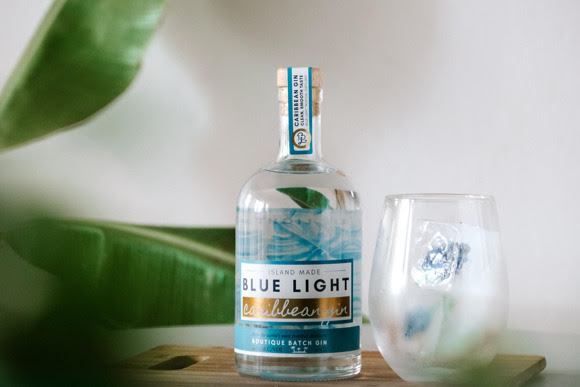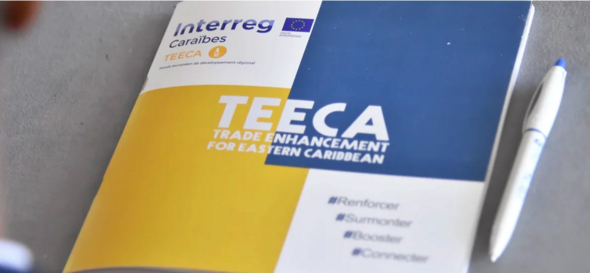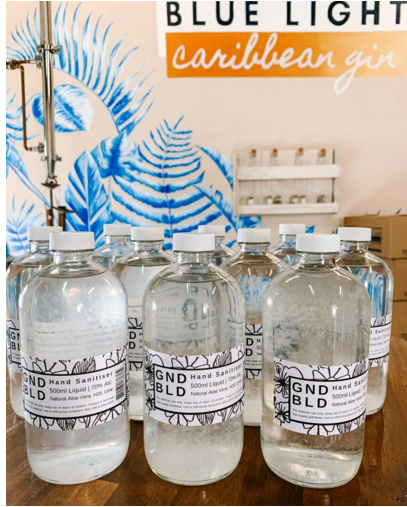Blue Light Distillery commits
Blue Light Distillery commits to the fight against COVID 19 in Grenada

OECS-Chamber of Commerce of Martinique Joint Media Release
Tuesday, April 7, 2020 — Many spirits and liquors producers across the Caribbean are mobilizing efforts in response to the growing need for sanitising solutions which are critical to mitigate the spread of COVID-19.
Grenada-based Blue Light Distillery also joined the fight against the virus.
The company, run by Jim Jardine that initially manufactures gin is one of the beneficiaries of the INTERREG Trade Enhancement for the Eastern Caribbean (TEECA) project, which is coordinated by the Chamber of Commerce of Martinique (CCI Martinique) along with the Organisation of Eastern Caribbean States (OECS), the Territorial Collectivity of Martinique and the Caribbean Export Development Agency (Caribbean Export).


Sanitisers became scarce or impossible to find in supermarkets in Grenada, as soon as the first case of COVID-19 was confirmed on the island on March 22, 2020.
The handmade gin brand Blue Light Distillery decided to embark on the manufacture of antiseptic solutions based on alcohol and aloe vera in response to this unprecedented situation. As of March 24, 2020, the company began to produce 100 bottles of 500 ml per day to supply the supermarkets.
The Director of Blue Gin Distillery Aaron Salyer, explained its decision to revamp the production from hand-crafted gin made with wild Canadian juniper berries to hand sanitisers.


Blue Light Distillery decided to manufacture hand sanitisers for two reasons. First of all, we have access to the high percentage alcohol necessary to make the antiseptic products which are essential in the fight against COVID-19. It also enables us to keep the business afloat during this crisis. Tourism plays a big role in our business. However, bars and hotels are closed, and cruise ships no longer dock in Grenada because of the pandemic. Salyer said.
The Director of Blue Gin Distillery also indicated that donations of sanitizers were made to senior citizens’ facilities and to people who are the most affected by poverty on the island.
The curfew introduced in Grenada on March 30 and the ban on the sale of alcohol has also impacted the young company founded in 2018.
The involvement in the fight against COVID-19 enabled the only hand-crafted gin manufacturing distillery of the island to survive while praying for the end of the pandemic and the return to normal economic and tourist activities in Grenada.
About the INTERREG TEECA project
The Trade Enhancement for the Eastern Caribbean (TEECA) project is co-funded by INTERREG Caraïbes and led by the Chamber of Commerce and Industry of Martinique (CCIM), in partnership with the Organisation of Eastern Caribbean States (OECS), the Caribbean Export Development Agency (Caribbean Export), and the Territorial Collectivity of Martinique (CTM).
The INTERREG TEECA project was launched in 2018. The programme aims to accelerate trade within OECS Member States by providing assistance to companies based in Martinique and the English-speaking countries of the OECS which wish to access to other markets. The INTERREG TEECA project fosters forging win-win partnerships within the entrepreneurship ecosystem of the region. Hence, 29 companies which were selected at the end of the call for projects are currently benefiting from a two-year tailor-made support programme to enable the export of their products and services to other markets.
This programme also aims to promote entrepreneurship among young people in the OECS Member States through the TECCA Caribbean Youth Entrepreneurship Challenge.
About INTERREG CARAIBES Programme 2014-2020
Coordinated by the Regional Council of Guadeloupe as the Managing Authority, INTERREG Caraïbes is a European Union programme which enables the French and European territories of Guadeloupe, French Guiana, Martinique and Saint-Martin, to undertake actions that foster cooperation with neighbouring countries of the Greater Caribbean. More than 35 countries from an area that encompasses Mexico in the north, to Venezuela in the south, are included among the potential partners of INTERREG-funded projects.





